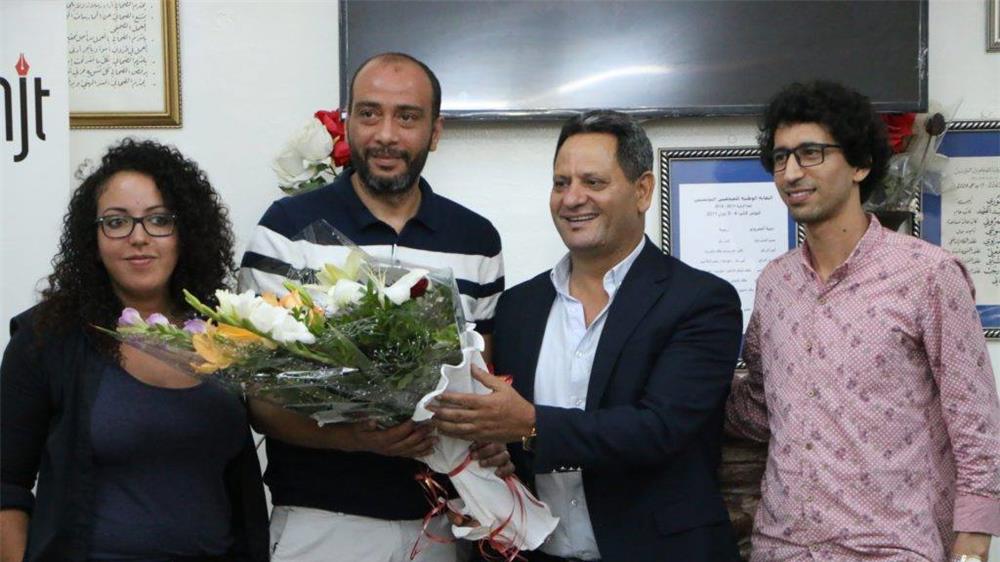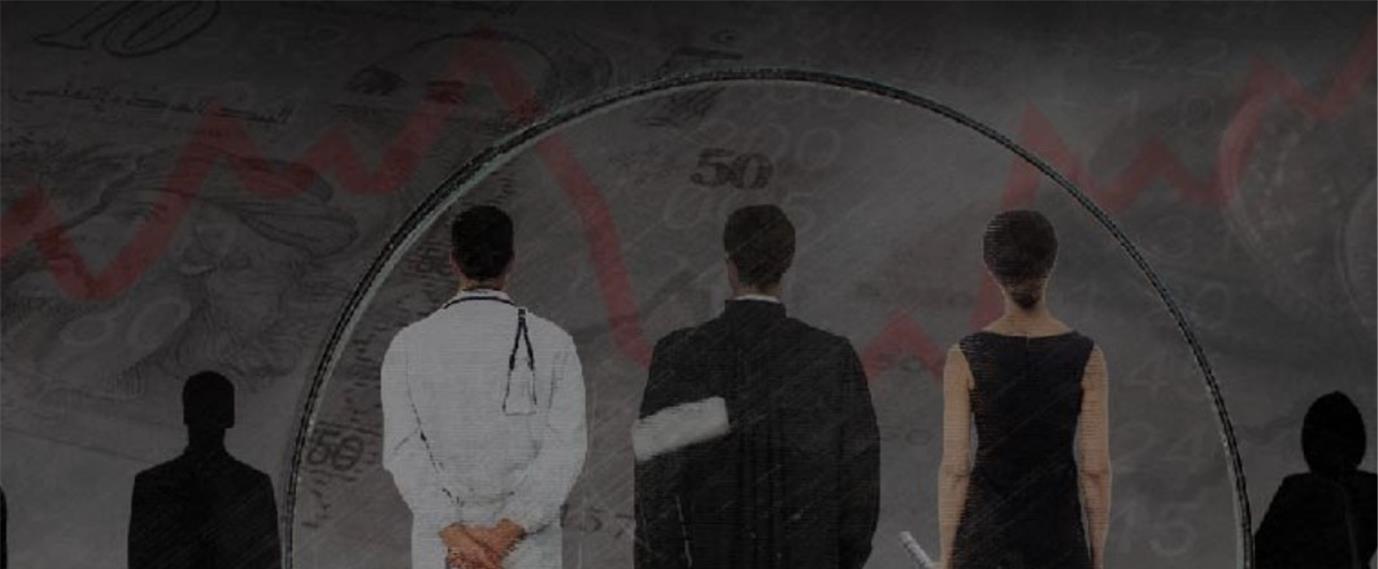أظهرت مرحلة ما بعد سقوط نظام بن علي تعطش الشعب التونسي إلى إعلام ينبش في عمق الحقيقة ليظهرها على السطح، فلم تكن ثورة 14 يناير/كانون الثاني فقط نقطة فاصلة في تاريخ الشعب بالانقلاب على سنين مظالم الحاكمومفاسده، وإنما مثلت أيضا نقطة انقلاب على المفاهيم القديمة للصحافة، التي فرضها نظامان متعاقبان: النظام البورقيبي ونظام بن علي.
حقبة جديدة أفرزت نماذج وأعراف استقصاء، تعززت بمجهودات شابة كنموذج "إنكيفادا"، وهي مجلة إلكترونية تاريخ ظهورها قصير، لكن سِجلّ عملها الاستقصائيوتحقيقاتها المدعومة بالوثائق والمصادر عُدت ديناميكية وواسعة في بيئة عمل ضيقة.
"إنكيفادا" ورحلة البحث عن الحقائق
اختيرت "إنكيفادا" للمساهمة في تحقيق "وثائق بنما"، وهو تحقيق برعاية دولية قدم براهين للرأي العام وأقام الحجة على أسماء ساسة وشخصيات اعتبارية ذكرت أسماؤها ضمن قائمة المتهربين من الضرائب.
وقد نشرت "إنكيفادا" الجانب المتعلق بتونس، مما فتح جبهة تحدّ كبيرة أمام صحفيِّيها وأظهر الحاجة الملحة إلى إعادة إنتاج صناعة صحفية تضع مصلحة الرأي العام فوق كل اعتبار، حسب ما أخبرنا مدير تحرير موقعها وليد الماجري وقال "عندما وقع اختيارنا لنشر وثائق بنما وكشف الفساد، كان عددنا يقارب 380 صحفيا من كافة دول العالم، وكان علينا أن نواصل ولا نفر من المعركة بذريعة خشيتنا من العقبات والعواقب.. عملنا على خدمة الصالح العام".
وحول الهجمة الإعلامية التي واجهها صحفيو "إنكيفادا" يقول الماجري "لم تكن سوى تصفية حسابات من أذرع إعلامية سولت لها نفسها أن تشكك في مهنيتنا؛ فقط لكسر ما نشر آنذاك، كما حاولت أن تنتصر لأسماء تربطها بها علاقة تُثبِتُ حجتنا ضدها".
أما بخصوص مدونة السلوك المعتمدة في ظل بيئة مثل تونس، فيؤكد الماجري أنه "حينما تكون لوسيلة الإعلام ترسانة أخلاقية تقتدي بها، لا يمكن أن تسقط في فخ المساءلة من أي كان.. نحن نعتمد الأخلاق الكونية الإنسانية الشاملة.. نقدم تحقيقاتنا بكل دقة ووضوح، لا نشتم ولا نزوِّر الحقائق.. هذا هو حجر الأساس في العمل الاستقصائي".
ماذا تغير بعد التحقيق؟
قد لا يرضى الصحفي عن عمله إلا إذا سأل نفسه هذا السؤال، فلا ريب أن التحقيق المثالي هو الذي يحدث رجّة في الرأي العام، أو ينجح في تغيير القوانين، أو ينبه إلى أن هناك شبهة ما، فيدفع بأصحاب القرار إلى أن يتخذوا إجراء بشأنه.
ويدعم هذا الرأي مارك هانتر أستاذ الصحافة الاستقصائية بجامعة باريس وأحد مؤسسي شبكة الصحافة الاستقصائية العالمية، إذ يقول "في العمل اليومي نعكس كصحفيين واقع المجتمع، وفي العمل الاستقصائي نهدف إلى تغيير واقع المجتمع".
مؤسس موقع "إنكيفادا" مالك الخضراوي يعي جيدا هذه الفكرة، فتحقيقه "وثائق بنما.. رحلة في العالم الخفي للشركات غير المقيمة" الذي أثار جدلا واسعا وصار حديث الرأي العام ووسائل الإعلام، قاد إلى فتح تحقيقات رسمية تبحث في منابع الفساد بناء على المعلومات المقدمة في متنه، باعتباره قد أزاح الستار عن تورط أسماء شخصيات تونسية سياسية في أعمال غير قانونية، مثل التهرب الضريبي وتبيض الأموال عبر شركات عابرة للحدود، مقدّما الأدلة على ذلك.
وحول مسألة القوانين الموضوعة قال الخضراوي إن أولى مشكلات الصحافة الاستقصائية ليست نابعة من القصور في التشريعات ولا غياب القوانين، بل من الصحفيين أنفسهم الذين يعتمدون طرقا أخرى للوصول إلى المعلومة، غافلين عن قانون النفاذ إلى المعلومة.
ويشير إلى أن "الصحفي سيقدّم عمله الاستقصائي بأريحية وثقة إن كان عارفا بحقوقه التي يكفلها القانون، كحق النفاذ إلى المعلومة وحق حماية المبلِّغين أو المصادر، أما أن يسلك طرقا ملتوية للحصول على المعلومة فهذا خطأ الصحفي وليس التشريعات.. وأبرز مثال على ذلك أننا عند نشرنا تحقيق وثائق بنما، دُعينا إلى الإدلاء بشهادتنا عند الهيكل القضائي كشهود لا كمتهمين كما خال البعض.. طُلب منا أن نذكر مصدراواعتذرنا عن ذلك وفق قانون حماية المصادر الشخصية، فوجدنا تفهما واقتناعا من الهيكل القضائي".
أثبتت تجربة "إنكيفادا" كفاءتها وأصبحت الاسم الاستقصائي الأبرز في تونس بسبب كمّ وجودة التحقيقات التي أنجزتها، مثل تحقيق عميق يكشف أسرار تهريب الأسلحة في تونس ومن يقف خلفها، وتحقيق "الاعتداءات الجنسية في أفريقيا الوسطى.. بصمات الجنود الفرنسيين"، وغيرهما.
ما يهمُّ نموذج "إنكيفادا" الشاب -وفق مؤسسه- أن يدحض الخوف والرهبة لدى البعض من دخول مجال الصحافة الاستقصائية، بتقديم الدعم المعنوي وتوجيه الصحفيين لخوضه بلا تردد. يقول الخضراوي "لدينا دور تحقيقي، أي أننا نغوص في أعماق الحقيقة ونقدمها للعموم بلا شائبة أو تشكيك. ولدينا دور تثقيفي، نفتح أعين العامة على قضايا ونفك شيفرتها ليفهمها. بالإضافة إلى الدور التوجيهي من خلال تنظيم دورات تدريبية وتعليمية لخلق جيل صحفي يراهن على نجاح العمل الاستقصائي تونسيا وعربيا".

استقصائي يوقع بـ"قناص الثورة"
تناقل المواطنون التونسيون أيام الثورة، وبعد سقوط عدد من المتظاهرين، عبارة غامضة هي "قنَّاص الثورة"، إذ كان المتظاهرون يسقطون بأياد خفية مجهولة الجهة، وبقي الغموض يلف القصة، بل كان مصيرها التكذيب أو النسيان.
الصحفي في موقع "إنكيفادا" قيس زريبة تتبع مراحل القصة معتمدا على نموذج أحد الضحايا، حتى توصَّل إلى أن شرطيّا قُتل بذات النوع من العيار الذي سقط به ضحايا آخرون، وكان القاتل عسكريا في الجيش الوطني.
في حوارنا معه، حكى قيس أن الطريقة المثلى للوصول إلى الحقيقة هي عدم الاكتفاء بالمتاح والظاهر، فخلف كل سطح هناك عمق وخلف كل ستار شباك يفتح على الحقيقة.. "الشرط الأهم لينجح التحقيق هو استقلال الصحفي عن أي سلطة، واستقلال الإدارة عن التحرير.. المناخ القانوني يسمح نسبيا بممارسة الصحافة الاستقصائية، لكن لا بد من إيمان الصحفي بثقافة الاستقصاء.. الباب مفتوح لهذه الممارسة في فترة تعد سابقة في تاريخ الصحافة بتونس".








































